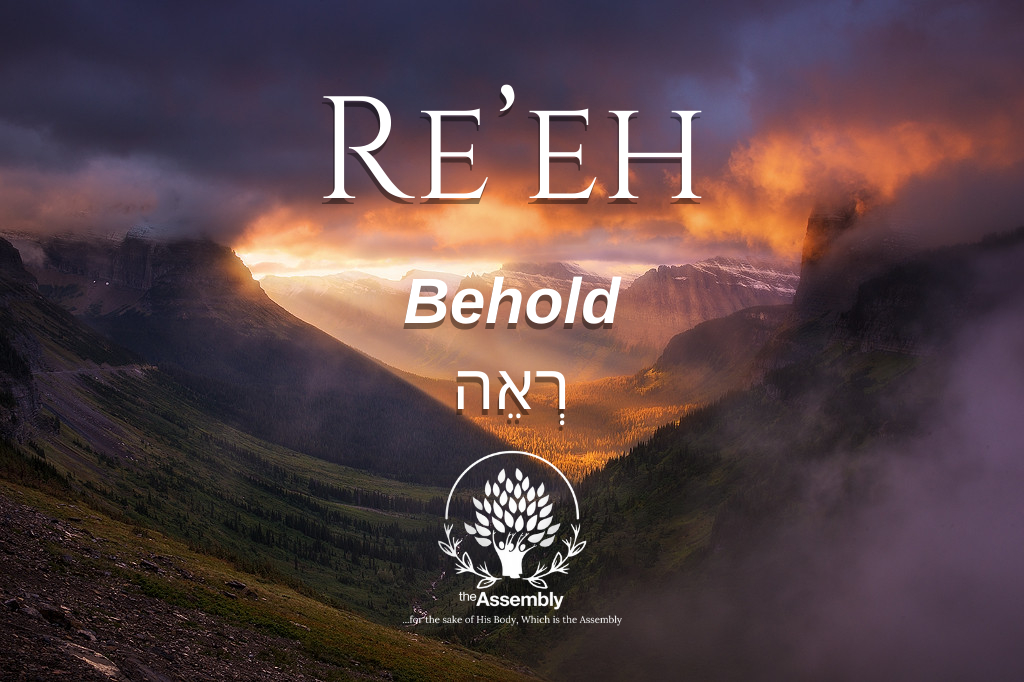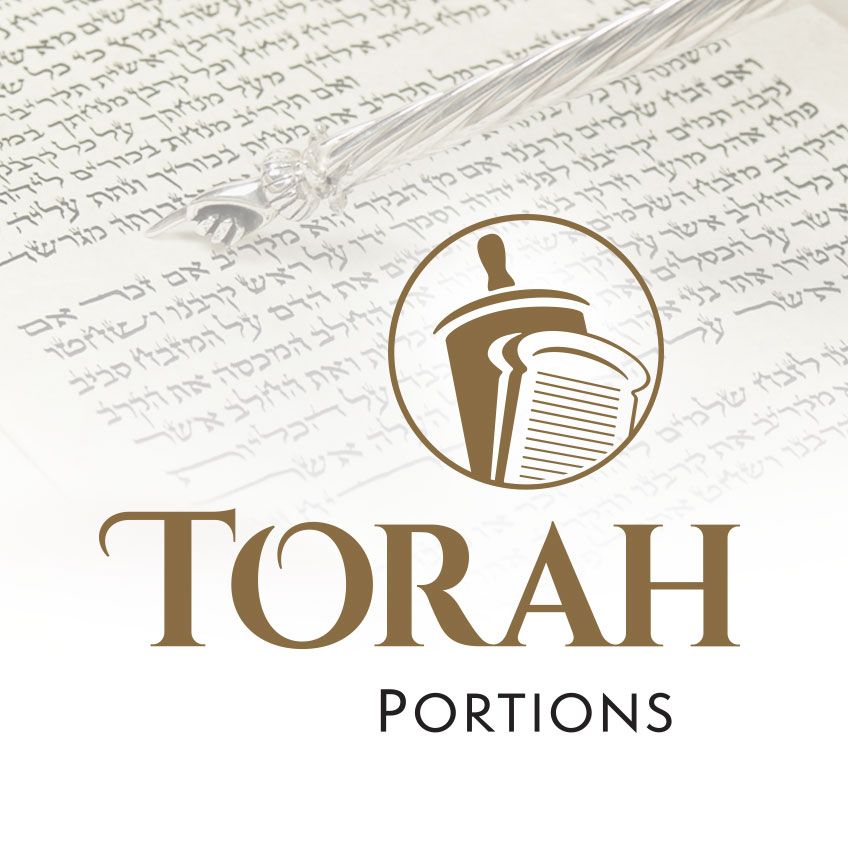WEEKLY TORAH PORTIONS

| Day | Portion Reading | |
|---|---|---|
| Sunday | Deuteronomy 11:26-12:10 | John 6:35–51 |
| Monday | Deuteronomy 12:11-28 | |
| Tuesday | Deuteronomy 12:29-13:19 | |
| Wednesday | Deuteronomy 14:1-21 | |
| Thursday | Deuteronomy 14:22-29 | |
| Friday | Deuteronomy 15:1-18 | |
| Shabbat | Deuteronomy 15:19-16:17 | Isaiah 54:11–55:5 |
Re’eh means “see.” This Torah portion presents a moral obligation to give to the poor and needy in our midst. It is not just a duty to support the less fortunate, it is a privilege.
.
“If there be among you a needy man, one of thy brethren, within any of thy gates, in thy land which the Lord thy God giveth thee, thou shalt not harden thy heart, nor shut thy hand from thy needy brother; but thou shalt surely open thy hand unto him, and shalt surely lend him sufficient for his need in that which he wanteth” (JPS 1917, Deut. 15:7–8).
Every person is entitled to live a decent life, and so, all of us who are able must do our part and make certain this happens for others.
Happily Giving
The Hebrew word tzedakah means more than just “charity”; it comes from the root tzedek meaning “righteousness” or “justice.” Giving to those in need is an act of justice and righteousness, and teaches us kindness.
There is another aspect to giving tzedakah: the attitude with which it is done. Maimonides, also known as the Rambam, writes that one who gives with a sour expression and a negative attitude loses his merit, even if he gives a thousand gold pieces; rather, giving should be done with joy, along with empathy and compassion. Compassion is further emphasized as the Rambam goes on to say that if a poor person asks of you to give him something, but you do not have anything in your possession to give him, you can comfort him with words. (Mishneh Torah, Laws of Gifts to the Poor 10:4–5)
When giving to those in need, let good character be the fuel that drives you. In giving generously, with the right heart, you are setting a positive example for your children and those who look up to you.
Keep in mind that tzedakah is not restricted to gifts of money only. Some other forms of charity include:
Giving your time. Volunteering at a homeless shelter, orphanage, or soup kitchen is a great way to use your time to help the less fortunate. Maybe you know someone who doesn’t have a car. You can offer to drive them to and from the grocery store so that it will be easier for them to buy their groceries. Even taking your time to encourage someone with a nice word is a way to show empathy for their plight.
Using your skills and talents. If you are a mechanic, you can use your skills to help fix someone’s car who can’t afford it. If you know how to sew, knit, or crochet, you can donate something you make to an orphanage, a Veteran’s hospital, or someone else in need. Do you know how to cut hair or do manicures and pedicures? You can offer your services to those who need a little pick-me-up.
Giving food and clothing. Do you love to cook? Maybe you know a family who is in need. A nice warm meal not only helps them with their food expenses, but warms their hearts as well. A gift card for the grocery store or a restaurant is another excellent way to let someone know you care about their needs. Do you have clothes that you don’t wear anymore? There are many places where you can donate them. Maybe you love to shop and have the means to buy new clothes for someone who needs them. This is another way to make someone feel good as well as valuable.
What have you been blessed with that you can bless someone else with? In the end, no matter what you have to offer, if you use it to help others who are in need, it is sure to bring joy not only to those you help, but to you as well.
WHAT IS TORAH?
The word Torah is taken from the root Hebrew word “yarah” meaning “to shoot an arrow” or “to hit the mark.” Properly used, the word “torah” refers to, “[the] teachings.” In a broad sense, Torah is the revelation of the Lord God (HaShem) to His people. Within this framework, and depending on the context, the term “Torah” can mean: (1) The five books of Moshe; (2) that, plus the Prophets and the Writings; (3) that, plus the Oral Torah, which includes the Talmud and later legal writings; (4) that, plus all religious teaching from the rabbis, including ethical and rabbinical teaching materials; or (5) all of the above as understood and interpreted in light of what Yeshua the Messiah and the rest of the New Covenant Scriptures have said about it. For the most part, we will be using definitions number (1), (2), and (5).
HISTORICAL BACKGROUND
The division of the Scriptures into chapters was done by non-Jews in the thirteenth century. They did so to facilitate their bible study, to make it easier to recall the exact source for any given verse.
Moses established the custom to publicly read from the Torah scroll every Shabbat—although the entire Torah was not necessarily completed in a yearly cycle.
The custom to complete the weekly public reading of the Torah every year (on the holiday of Simchat Torah) finds its root in Babylon of the Talmudic Era. The Torah was then divided into fifty-four sections to allow for the completion of a yearly cycle with the reading of one Parshah per week.
Incidentally, the word "parshah" can also refer to a grouping of words or verses in the Torah. These (portions) parshiyot – which the dividers of the Torah into chapters barely took into consideration – can be as brief as two words, or as long as an entire weekly Torah reading. These parshiyot are separated in the Torah Scroll by a blank space. There is a total of 669 such parshiyot in the Five Books of Moses.)
TORAH READINGS
Immediately following this brief introduction, you will find Weekly Torah Portions and a daily breakdown for the weekly readings. You'll find a new week posted below, typically on Saturday evenings, which is the beginning of our week as prescribed by the instructions of Torah.
All the Best,
Chukat means “decree.” After forty years of journeying through the desert, the Children of Israel arrived at the wilderness of Zin and stopped at a location called Kadesh. It was there that Miriam, the sister of Moses and Aaron, died and was buried. We are then told that the people had no water, and they assembled against Moses and Aaron.
Jewish tradition explains that in Miriam’s merit, there was a well of water, called “Miriam’s Well,” which miraculously provided water throughout their forty years of wandering in the desert. After her death, the water ceased, and the people began to complain bitterly.
God told Moses to take the staff and assemble the people together by a certain rock which Moses was to speak to so that it would bring forth water. Instead, he took the staff and struck the rock in anger. Why didn’t Moses do what God told him to do?
Moses was bereaved, overcome with emotions. His sister had just died, and he was in a state of grief. Miriam was the one who watched over him when he was in the Nile River, making sure he would be safe. Once her baby brother was found by Pharaoh’s daughter, she boldly offered to find a Jewish woman to nurse him, so that he could be nursed by his own mother. She was a protective sister. She was a fundamental and beloved part of Moses’ life.
Greatly grieved by his sister’s death, Moses became frustrated because of the (once again) complaining Israelites. Moses, who was normally patient, lost control, became short on patience, and hit the rock in anger.
Between a Rock and a Hard Spot
What do you do when you get frustrated and angry? A difficult situation at work, worry over finances, tension in your marriage, or the loss of a loved one are just a few examples of situations in our lives that can lead to grief, anger, or frustration. Even though situations such as these may feel overwhelming and unbearable, it is better to address these issues themselves before you “strike the rock,” so to speak—before you lose control and end up hurting yourself and others around you.
At the moment Moses was facing the rock, he struck it in frustration instead of speaking to it as God had told him to. We all have a “rock” to face. At the moment you stand before that rock, how do you react? Some of us turn to hitting instead of speaking. Some of us speak before we listen. Some of us remain silent when we should be speaking. Some of us lash out in grievous anger.
Like Moses, we all make mistakes. But when we do, we should learn from them, continue to move forward, learn to react differently, and try to be our best.
The question is: The next time you are faced with your rock, how can you react differently?
- Speak kindly and with clarity rather than lashing out with angry words.
- Listen twice as much as you talk. If you listen before you speak, you’re less likely to say or do something that you’ll regret later on.
- Think more positively about the situation. There is power in positive thought.
- Surround yourself with positive people. Right relationships can be life-changing. These are the people in your life who can help you through your grief, anger, worries, or frustration.
- Pray for wisdom.
Begin making these daily habits that will prepare you for success the next time you face that rock.

